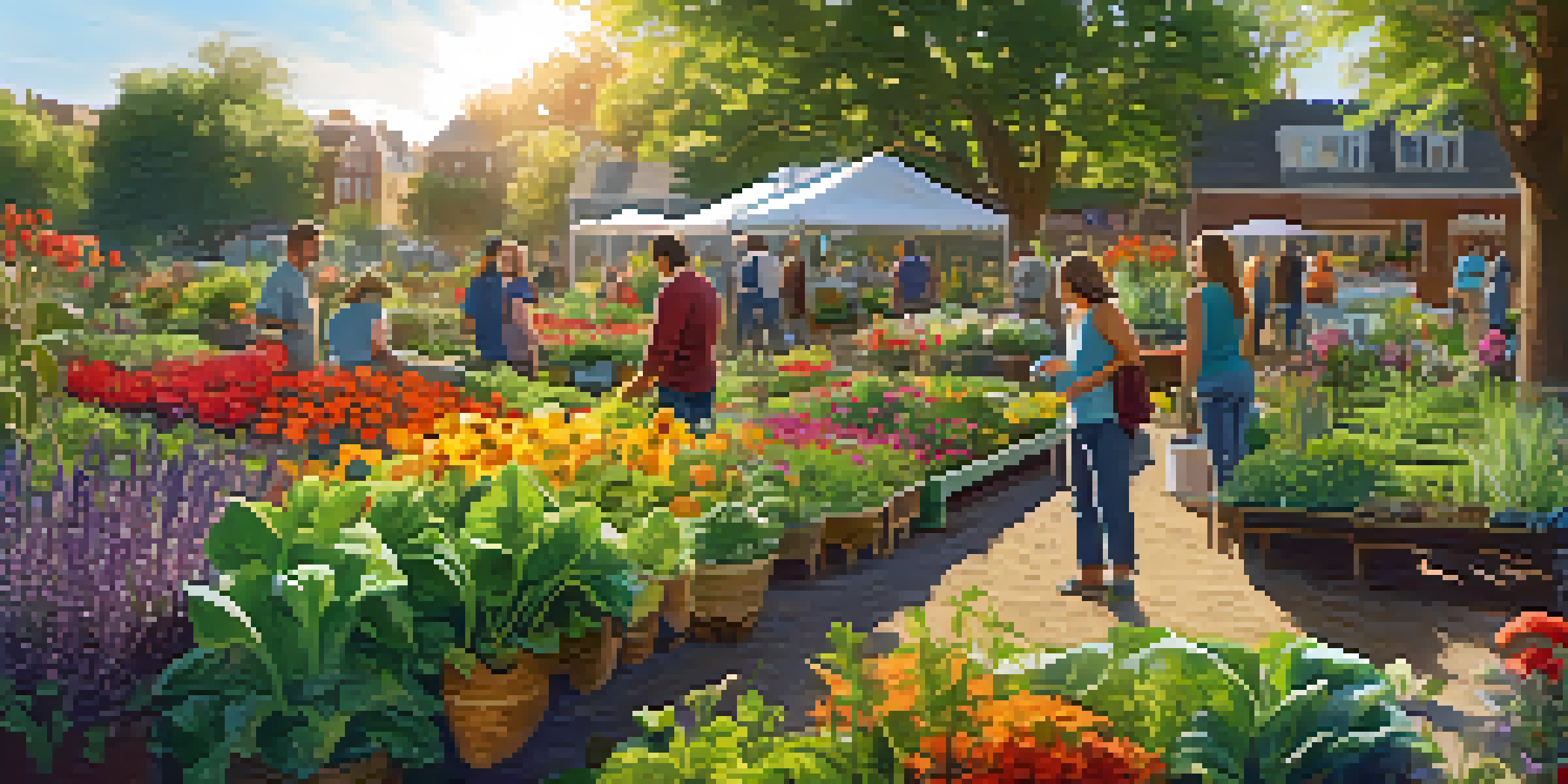The Impact of Community Gardens on Local Food Systems

Understanding Community Gardens and Their Purpose
Community gardens are shared spaces where individuals come together to grow fruits, vegetables, and flowers. They often serve as a hub for local residents, fostering a sense of community and collaboration. These gardens not only provide fresh produce but also play a vital role in educating people about sustainable agriculture and healthy eating.
The greatest gift of the garden is the restoration of the five senses.
In urban areas, where access to fresh food can be limited, community gardens can be a game-changer. They transform vacant lots or underutilized spaces into vibrant green areas, promoting biodiversity and improving local ecosystems. Additionally, they empower people to take control of their food sources, promoting self-sufficiency.
Overall, community gardens are much more than gardening spaces; they are vital components of local food systems, enhancing food security and community resilience. By understanding their purpose, we can appreciate the broader impact they have on society.
Boosting Food Security in Urban Areas
Food security refers to the availability of and access to nutritious food, a challenge many urban dwellers face. Community gardens directly address this issue by providing fresh produce, often at little to no cost. This is particularly important in food deserts—areas with limited access to affordable and nutritious food options.

When individuals participate in community gardens, they not only gain access to fresh fruits and vegetables but also learn how to grow their own food. This knowledge can be invaluable, especially for families looking to reduce grocery bills while improving their diets. The act of gardening itself can foster a more profound appreciation for food sources and nutrition.
Community Gardens Enhance Food Security
By providing access to fresh produce, community gardens help combat food deserts and promote self-sufficiency among urban residents.
By enhancing food security, community gardens contribute to healthier communities and can reduce reliance on processed foods. This shift is crucial for addressing public health issues, including obesity and related diseases, often exacerbated by poor diet.
Fostering Community Engagement and Social Ties
Community gardens serve as social hubs where people from diverse backgrounds come together, fostering connections and friendships. This engagement is vital, as it helps break down barriers and builds trust among neighbors. In many cases, these gardens become a source of pride for the community, uniting individuals in a common goal.
Gardening adds years to your life and life to your years.
Moreover, the collaborative nature of gardening encourages teamwork and communication skills. Participants often share gardening tips, recipes, and even cultural traditions related to food, enriching the community’s social fabric. This exchange of knowledge and experiences can create a supportive environment that promotes personal growth and mutual respect.
In essence, community gardens cultivate not just plants but also relationships. The sense of belonging and community spirit that flourishes in these shared spaces can lead to stronger, more resilient neighborhoods.
Promoting Sustainable Practices and Environmental Awareness
Community gardens play a pivotal role in promoting sustainable agricultural practices. By encouraging organic gardening techniques and permaculture principles, these spaces can enhance local biodiversity and reduce the carbon footprint associated with food production. Participants learn the importance of soil health, crop rotation, and pest management, which can be applied in their own homes.
Additionally, community gardens often serve as educational platforms, teaching people about composting, water conservation, and the importance of native plants. This hands-on experience fosters a deeper understanding of environmental stewardship and the impact of individual choices on the planet. As participants become more aware of sustainability issues, they are likely to adopt more eco-friendly habits in their daily lives.
Fostering Social Connections
These gardens serve as social hubs, bringing together diverse individuals and cultivating a sense of community and belonging.
Ultimately, community gardens create a culture of sustainability, inspiring individuals to think critically about their environmental impact. This not only benefits the local ecosystem but also contributes to global efforts in combating climate change.
Enhancing Mental Health and Well-Being
Gardening is often praised for its mental health benefits, and community gardens provide an excellent opportunity for individuals to experience these advantages. Spending time in green spaces has been shown to reduce stress, anxiety, and depression, promoting overall well-being. The act of nurturing plants can also foster a sense of purpose and accomplishment.
Moreover, the social interactions that occur in community gardens can alleviate feelings of loneliness and isolation. Engaging with others in a shared activity can create bonds that significantly enhance mental health. For many, these gardens become a refuge, a place to escape from the pressures of daily life.
In this way, community gardens not only contribute to physical health by providing fresh produce but also support emotional and mental wellness. The holistic benefits of gardening can lead to a more balanced and fulfilling life.
Economic Benefits of Community Gardens
Beyond their social and environmental impacts, community gardens can also provide significant economic benefits. By growing their own food, participants can reduce grocery expenses, which is particularly beneficial for low-income families. This savings can make a considerable difference, allowing families to allocate resources to other essential needs.
Moreover, community gardens can stimulate local economies by creating job opportunities related to gardening, education, and even food production. Some gardens sell produce at local markets, contributing to the local food economy and promoting the concept of 'buying local.' This not only supports local farmers but also strengthens community ties.
Promoting Sustainability Awareness
Community gardens educate participants on sustainable practices, fostering environmental stewardship and reducing carbon footprints.
As community gardens flourish, they can attract tourism and community events, boosting foot traffic and visibility for nearby businesses. The economic ripple effect of these gardens can foster a vibrant, interconnected community.
Challenges Facing Community Gardens Today
Despite their numerous benefits, community gardens face several challenges that can hinder their success. One significant issue is securing land tenure; gardeners often struggle to maintain access to the land they cultivate. Without long-term agreements, gardens can be at risk of displacement, particularly in urban areas where real estate development is rampant.
Additionally, funding and resources can be limited, making it difficult for gardens to thrive. Many rely on grants, community support, and donations, which can fluctuate. This lack of financial stability can prevent gardens from expanding or improving their facilities, impacting the overall experience for participants.

Finally, community engagement is crucial for sustainability, but it can be challenging to maintain enthusiasm over time. As community dynamics shift, gardens must continually adapt to the needs and interests of their participants to remain relevant and impactful.